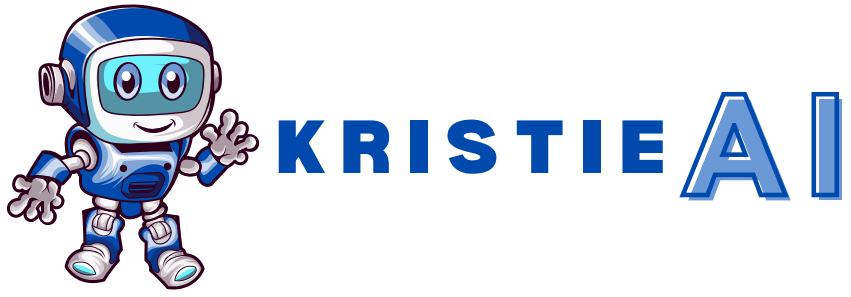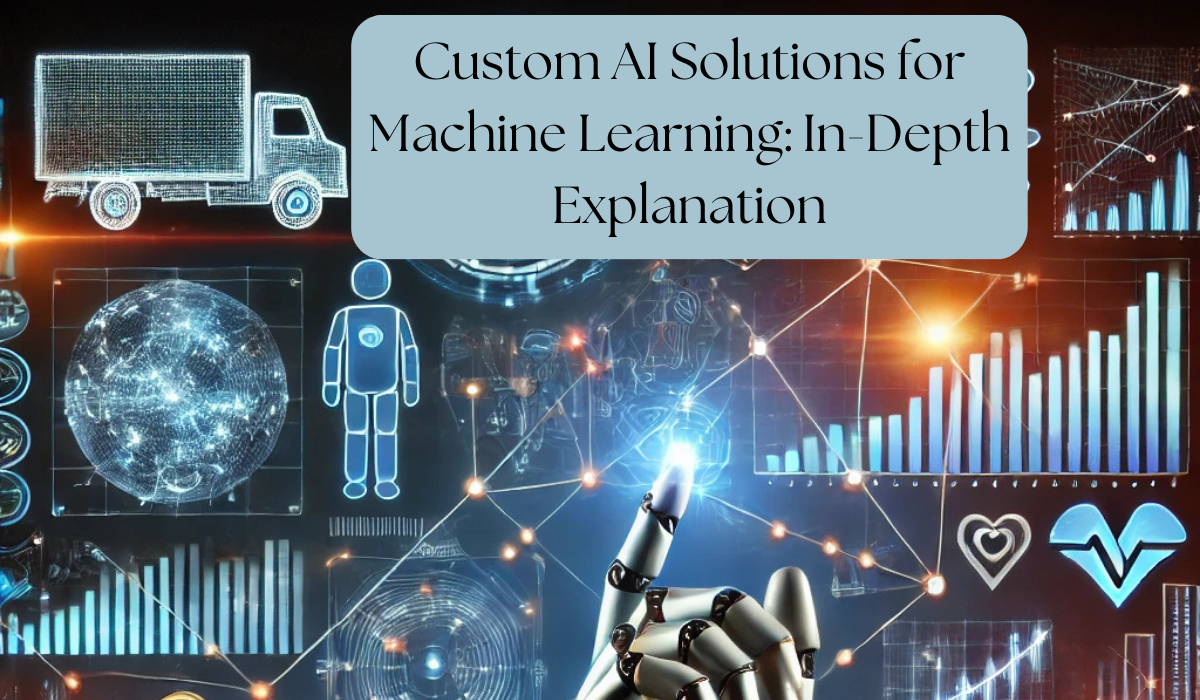Artificial Intelligence (AI) and Machine Learning (ML) are reshaping the way problems are addressed across various industries. These technologies enable computers to learn patterns from data and make decisions without constant instructions. While general-purpose AI tools are helpful, they often fall short when addressing unique or specialized needs. This is where custom AI/ML solutions excel.
Custom AI solutions are crafted specifically to meet unique requirements. They are designed to solve highly specialized problems, ensuring optimal efficiency and accuracy. For instance, a healthcare provider might need an AI tool to detect early signs of disease in medical scans, while a retailer might seek a system that forecasts seasonal product demand. These tailored solutions provide personalized capabilities and deliver better results than off-the-shelf AI products.
Custom Machine Learning & AI Solutions
What Are Custom AI/ML Solutions?
Custom AI/ML solutions are intelligent systems developed to meet specific needs. Unlike generic AI tools designed for a wide audience, these solutions are built to handle particular tasks or challenges within an organization. They are highly targeted and work efficiently for specialized applications.
For example
- A hospital may need an AI system to analyze patient data and predict potential complications.
- A retail store might implement a custom ML tool to analyze sales data and optimize inventory for maximum profits.
Why Do They Matter?
Custom AI/ML solutions are important for several reasons:
- Solve Specific Problems: These solutions address challenges that generic tools cannot handle effectively.
- Increase Efficiency and Accuracy: By focusing on a single task, custom tools minimize errors and streamline workflows.
- Provide a Competitive Edge: Businesses using tailored AI solutions can outperform competitors by automating processes and gaining better insights.
Examples of Custom AI/ML Solutions
- A hospital chatbot that provides patients with accurate, instant answers and schedules appointments.
- An AI-powered retail system that forecasts shopping trends, helping businesses stock the right products at the right time.
Custom AI/ML Solutions Development
Developing a custom AI solution involves multiple steps to ensure it meets specific needs and performs optimally.
Key Steps in Development
Identifying the Problem
- The first step is understanding the challenge or goal the solution aims to address.
- Example: A school might want to create a system that tracks individual student performance and provides personalized learning suggestions.
Data Collection and Preparation
- AI systems need high-quality data to learn and perform effectively. Data is collected, cleaned, and organized to ensure accuracy.
Model Design and Training
- A machine learning model is built and trained using the prepared data.
- Example: Training an AI model to detect diseases by analyzing thousands of medical scans.
Testing and Optimization
- The system undergoes rigorous testing to check its accuracy and reliability. Adjustments are made to improve performance.
Deployment
- Once ready, the solution is integrated into the user’s workflow, such as a business’s software or a healthcare provider’s systems.
Maintenance and Updates
- Custom AI solutions require regular updates to handle new data and ensure they remain effective over time.
Tools and Techniques Used
Developers use advanced platforms like TensorFlow, PyTorch, or cloud-based AI tools to create these solutions. These tools provide powerful frameworks for building and training custom models.
Benefits of Custom AI/ML Solutions
Custom AI/ML solutions offer unique advantages compared to generic systems:
- Personalization: These solutions are designed specifically for the task, ensuring they meet the exact needs of the user.
- Improved Performance: Custom AI systems are more accurate because they are trained on data specific to their purpose.
- Cost and Time Savings: By automating repetitive or complex tasks, they save significant time and reduce operational costs.
- Flexibility and Scalability: As businesses grow or their needs change, custom solutions can adapt to handle new challenges.
Applications of Custom AI/ML Solutions
Custom AI solutions have wide-ranging applications across industries:
Healthcare
- AI detects early signs of diseases in medical images like X-rays or MRIs.
- Custom solutions suggest personalized treatment plans for patients based on medical history and current symptoms.
Retail
- AI predicts which products will sell best during specific seasons, helping stores optimize their inventory.
- Personalized recommendations are generated for customers based on their shopping habits.
Finance
- Custom AI systems identify fraudulent transactions by analyzing unusual patterns.
- Predictive tools assist businesses in making better investment decisions.
Education
- AI-powered platforms create personalized learning experiences tailored to each student’s pace.
- Progress tracking tools highlight areas where students need improvement.
Manufacturing
- Predictive maintenance ensures machines are serviced before they break down, reducing downtime.
- AI improves production efficiency by identifying waste or inefficiencies.
Logistics
- Delivery routes are optimized to save time and fuel.
- Demand forecasting helps businesses plan inventory and resources effectively.
How to Choose a Custom AI/ML Solution
Selecting the right custom AI/ML solution involves several considerations:
Evaluate Needs
- Clearly define the problem or challenge you aim to solve. Example: Do you need a tool for customer service, data analysis, or predictive maintenance?
Choose the Right Developer
- Work with experts who understand your industry and have a proven track record of delivering AI solutions.
Consider Data Requirements
- Ensure you have access to clean and high-quality data for training the AI model.
Measure Success
- Set measurable goals and track the performance of the solution to ensure it delivers the desired outcomes.
Future of Custom AI/ML Solutions
As technology advances, custom AI/ML solutions will play an even bigger role in shaping industries:
- Growing Demand: Businesses of all sizes are adopting tailored AI tools to stay competitive.
- Advances in Technology: Better algorithms and development platforms will make creating custom AI solutions faster and more affordable.
- Potential Challenges: Data privacy concerns, integration complexities, and ongoing maintenance will need to be addressed for these systems to succeed.
Frequently-Asked-Questions (FAQs)
Custom AI/ML solutions are specifically designed to solve unique problems or tasks for a particular user, business, or industry. Unlike general AI tools, which are built for broad, common applications, custom solutions are tailored to individual needs. For instance, a retail store might use a custom ML solution to forecast sales trends, while a hospital might need one for diagnosing diseases.
Data is the foundation of any AI/ML solution. In custom solutions, data specific to the task is collected, cleaned, and used to train the machine learning model. This ensures the solution can understand patterns and deliver accurate results. For example, a logistics company may use delivery data to train a custom AI model to optimize routes.
Yes, small businesses can greatly benefit from custom AI/ML solutions. These tools can automate repetitive tasks, improve efficiency, and provide insights that might be difficult to uncover otherwise. For example, a small online shop could use a custom solution to recommend products to customers based on their browsing history.
Developing custom AI/ML solutions can present challenges like gathering sufficient high-quality data, ensuring proper integration with existing systems, and maintaining data privacy. Additionally, the cost and time required for development might be higher than using general-purpose tools. However, the long-term benefits usually outweigh these challenges.
Custom AI/ML solutions are designed to adapt and evolve. Regular updates, retraining with new data, and ongoing maintenance ensure that the solutions remain effective and up to date. This flexibility allows them to grow with the user’s needs, making them a sustainable and valuable investment.
Conclusion
Custom AI and ML solutions are reshaping the way industries tackle their most complex challenges. Unlike general-purpose AI tools, these solutions are tailored to address specific problems with precision. They go beyond standard functionalities, offering highly personalized approaches that cater to the unique needs of businesses, institutions, and individuals.
The power of custom AI solutions lies in their ability to deliver unparalleled accuracy and efficiency. By focusing on a single task or a set of specific objectives, these tools streamline operations, automate repetitive processes, and reduce the risk of human error. For instance, in healthcare, AI can help doctors detect diseases early with advanced diagnostic models. In retail, it can forecast customer behavior and optimize inventory management. Each solution is designed to fit seamlessly into existing workflows, ensuring that businesses achieve faster and better outcomes.
Moreover, custom AI solutions save valuable time and resources. Automating manual or labor-intensive tasks frees up employees to focus on more strategic activities. For example, chatbots can handle thousands of customer inquiries simultaneously, while predictive analytics tools help companies make informed decisions without spending countless hours analyzing data. This cost-effective approach allows businesses to achieve higher productivity without additional staffing or overhead expenses.
The ability to adapt to changing needs is another key advantage of custom AI. These solutions are scalable, meaning they can grow with an organization’s requirements. As industries evolve, the same AI tools can be updated and optimized to handle new challenges or incorporate additional features. This flexibility ensures that custom AI solutions remain relevant and effective over time, giving organizations a competitive edge.
The future of AI lies in its customization and adaptability. As technology advances, industries will demand even more specialized solutions to solve problems unique to their fields. Custom AI will play a critical role in this landscape, providing tools that not only enhance operations but also foster innovation. However, organizations must also navigate challenges such as data privacy, ethical considerations, and the need for continuous updates to keep these systems reliable.
For businesses and individuals, embracing custom AI and ML solutions is no longer optional—it’s a necessity. The rapidly changing technological environment rewards those who adopt smarter, more efficient ways of working. By leveraging these solutions, organizations can unlock new opportunities, drive innovation, and stay ahead of the competition.
In summary, custom AI and ML solutions are not just tools; they are catalysts for growth and transformation. They empower industries to solve unique problems, adapt to change, and achieve results that were once thought impossible. The organizations that invest in tailored AI systems today will be the pioneers of tomorrow, leading the way in a world driven by technological excellence.




